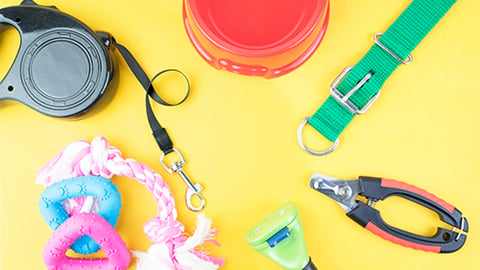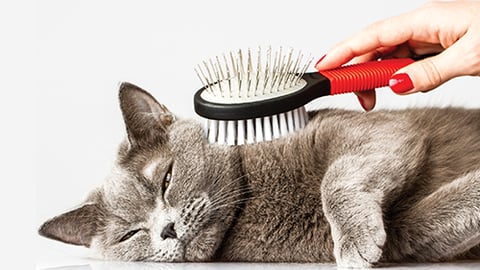Pet Owners Making the Cannabis Connection
"I was skeptical at first, but now I’m a believer,” asserts Allison Williams, a 39-year-old nail technician from Roanoke, Va. After spending months looking for some relief for her elderly cat’s feline arthritis, Williams tried CBD oil on the recommendation of a friend, and couldn’t believe the results. “I’m practically an evangelist now,” she adds. “I’m always telling everyone about it. If you love your pet, give them CBD.”
Key Takeaways
- Now that the pet product market has embraced CBD in the same way that human wellness brands have, there are many options on retail store shelves.
- CBD products can help animals with such issues as pain management, internal inflammation and, in particular, anxiety.
- The target consumers for these products will often be pet owners in search of alternatives to prescription drugs or pricey medical intervention, with product quality a huge factor in sales.
It’s no secret that humans love their pets. More than half of American homes include a pet, according to the Stamford, Conn.-based American Pet Products Association (APPA). “Our pets are a part of our families, so naturally people treat them as such,” says Vincent Gillen, VP of sales for Tampa, Fla.-based Global Widget LLC, the manufacturer and distributor of Perfect Paws Hemp for pets, Hemp Bombs and Nature’s Script. “Just as we ensure that everything we use on a daily basis is of the best material and uses premium ingredients, we want our pets to have premium-made toys, food, supplements, bedding products and additional pet supplies.”
CBD and Your Pets
Humans have been using CBD oil products for decades to relieve anxiety and depression, reduce inflammation, improve sleep patterns, and combat health conditions like epilepsy. In the past decade, as pro-cannabis attitudes and legislation have swept the United States, CBD products have become highly popular. As humans discovered the health benefits of these products, they also began to wonder whether their pets could benefit as well.
Now that the pet product market has embraced CBD in the same way that human wellness brands have, there are many options on the shelves. “CBD can be used in edible form such as oils, or in a topical form such as paw butter,” notes Gillen. Global Widget’s Perfect Paws Hemp Paw Butter is a topical product that gently repairs dry and cracked paws while adding an extra layer of protection against harsh terrain. Each 2-ounce container contains 250 milligrams of CBD and is prepared with a blend of natural oils such as coconut and sweet almond oil.
"One of the biggest misconceptions about CBD is that it’s marijuana. While the plants are both members of the cannabis family,” explains Gillen, “they differ significantly in composition. Hemp plants have less than 0.3% THC [tetrahydrocannabinol, the principal psychoactive constituent of cannabis]. In contrast, marijuana has anywhere from 3% to 35% THC.”
Actually, CBD — short for cannabidiol — is just one type of cannabinoid that comes from cannabis. Other notable cannabinoids include CBG, CBN and THC.
“All have specific functions in our body,” observes Derek Thomas, VP of business development for Fort Lauderdale, Fla.-based Veritas Farms, a vertically integrated full-spectrum hemp oil product manufacturer and brand. “But it is the combination of them that has the most pronounced effect on us, called the Entourage Effect. Formulations that naturally include all of the cannabinoids found in cannabis [are] called full-spectrum hemp oil and ... considered superior to CBD-isolate products.”
When used properly, CBD offers a host of benefits for pets. “It can help animals with pain management, internal inflammation and, most commonly, anxiety,” says Sean McDonald, COO of Corona, Calif.-based CBD Living, one of the fastest-growing global CBD manufacturers and distributors. “We see a lot of customers buying our products for anxious pets.” With more than 100 items in 5,000 stores, and shipping to consumers worldwide, CBD Living offers a wide variety of products, including tablets, sprays and topical solutions.
“A new study in Scientific Reports found that more than 70% of dogs experience anxiety,” continues McDonald. “This can be year-round, but also situational. For example, we find that our sales spike around the holiday season and around holidays that typically involve fireworks. From younger dogs and rescue animals with separation anxiety, to older pets with age-related joint pain and mobility issues, CBD can be helpful through all stages of an animal’s life.”
Stocking Up
When choosing which products to stock on retail shelves, it’s important to choose those that appeal to your customer base. In terms of CBD products, your audience will often be pet owners who want alternatives to prescription drugs or pricey medical intervention. Product quality will be a huge factor in sales. Do your research before you stock the shelves. The most important things to keep in mind when researching brands and products in the pet CBD category are quality, safety and transparency.
Pet CBD products require very specific packaging requirements. Gillen lists the elements of a good label: “Labels should include all the product’s ingredients, both active and additional ingredients; QR codes; batch numbers; expiration dates; and where the product was made. The QR codes and batch numbers are the information that consumers will need to look up full-panel third-party lab results, ensure the compliance and safety of the product for their pets, and read additional CBD education resources.”
Lab testing is especially important because consumers should be able to independently confirm the ingredients of the products. The COA (Certificate of Analysis) should come from an ISO (International Organization for Standardization)-certified lab. Veritas Farms’ Thomas gives more details: “The COA needs to consist of a cannabinoid profile analysis, terpene analysis, pesticide/fungicide/herbicide analysis, heavy-metal analysis and mycotoxin/microbial analysis. There is a key final piece here that many miss — that COA needs to be directly tied to the product via a lot or batch number that is specific to that product and COA.” This allows consumers to cross check the specific information, which is important to the well-informed buyer.
Veritas Farms — which takes its name from the Latin word for “truth” — is known as a trusted brand in this category because of its dedication to transparency. Thomas warns against stocking brands that don’t value transparency as much. “There are many opportunistic brands out there,” he cautions. “If a brand cannot give you complete visibility on their supply chain and cannot provide you with a third-party ISO-certified lab’s analysis that tests for potency and all contaminants and matches to the lot/batch number of the product, then they probably should be avoided.”
More Good Advice
That’s also the case if you’re working with a company that just expanded its product lineup with a CBD product instead of producing a fully developed CBD line from the ground up. CBD Living’s McDonald says that retailers have to be careful about choosing which product to stock.
“Retailers should look for companies that have a history in the market — companies that aren’t just adding CBD products to their existing non-CBD lines just to be trendy,” he advises. “CBD Living is a CBD company. Always has been, always will be. Expanding into the pet product sphere was a natural step for us.” For pets, the company offers a 5-milligram CBD supplement in a hard chew, a soft chew and a gel cap, covering a wide range of consumer needs.
There’s an education requirement for these products as well. The average customer may be interested in CBD products but not know what to look for. “Consumers need education on CBD, the industry and different products available,” explains Gillen. “Consumers should know what compliant packaging and labeling looks like, how to properly read it, and how to access full-panel third-party lab results via the QR code, which should clearly be visible on the label, to be reassured of the product’s safety, ingredients and potency.”
Further, price is always a huge factor for consumers. Remember that most of these CBD products will also be available on the manufacturers’ websites and other online sources. “Retailers should be confident that the product they are selling in their store will be less expensive in retail locations than on a manufacturer’s website,” notes Gillen. “Additionally, for those just starting in offering CBD pet products, keep it simple with a limited SKU selection.”
He adds: “As for merchandising techniques, retailers should place product in high-traffic areas and should utilize marketing resources from their vendor, including stickers, floor decals, window clings and educational material.”










